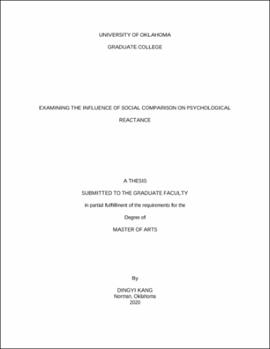| dc.contributor.advisor | Banas, John | |
| dc.contributor.author | Kang, Dingyi | |
| dc.date.accessioned | 2020-05-08T21:34:02Z | |
| dc.date.available | 2020-05-08T21:34:02Z | |
| dc.date.issued | 2020-05 | |
| dc.identifier.uri | https://hdl.handle.net/11244/324351 | |
| dc.description.abstract | This thesis integrates social comparison theory (Festinger, 1954) and psychological reactance theory (Brehm, 1966) to examine the effects of controlling language and comparison types on psychological reactance and attitudes. Two 3 (comparison types: upward contrast vs. no contrast vs. downward contrast) × 2 (controlling language: high vs. low) independent group experiments were conducted. Both studies revealed main effects of controlling language on perceived threat to personal freedom and anger in response to the message. The results also revealed the main effects of comparison types on anger to the messages and attitude to recycling. For anger to the message, there were no interaction effects between comparison types and controlling language on it in neither of these studies. However, for attitude to recycling, Study 1 revealed that the effect of controlling language on it could be overwhelmed and neutralized by the effects of both upward contrast and downward contrast on it. | en_US |
| dc.language | en_US | en_US |
| dc.subject | psychological reactance theory | en_US |
| dc.subject | social comparison theory | en_US |
| dc.subject | comparison types | en_US |
| dc.subject | controlling language | en_US |
| dc.subject | persuasion | en_US |
| dc.title | Examining the Influence of Social Comparison on Psychological Reactance | en_US |
| dc.contributor.committeeMember | Bessarabova, Elena | |
| dc.contributor.committeeMember | Meirick, Patrick | |
| dc.date.manuscript | 2020-05-06 | |
| dc.thesis.degree | Master of Arts | en_US |
| ou.group | College of Arts and Sciences::Department of Communication | en_US |
